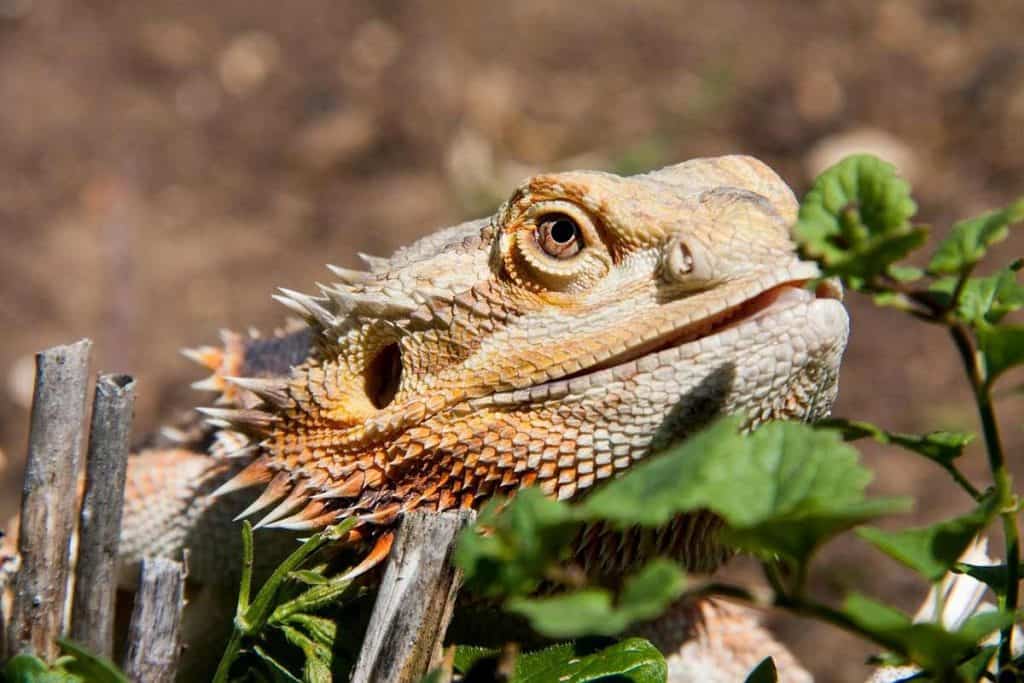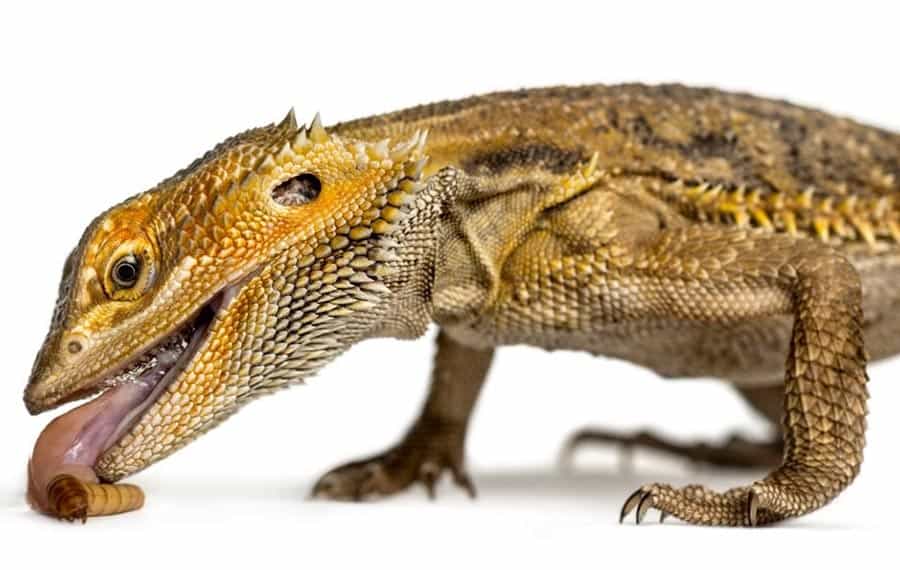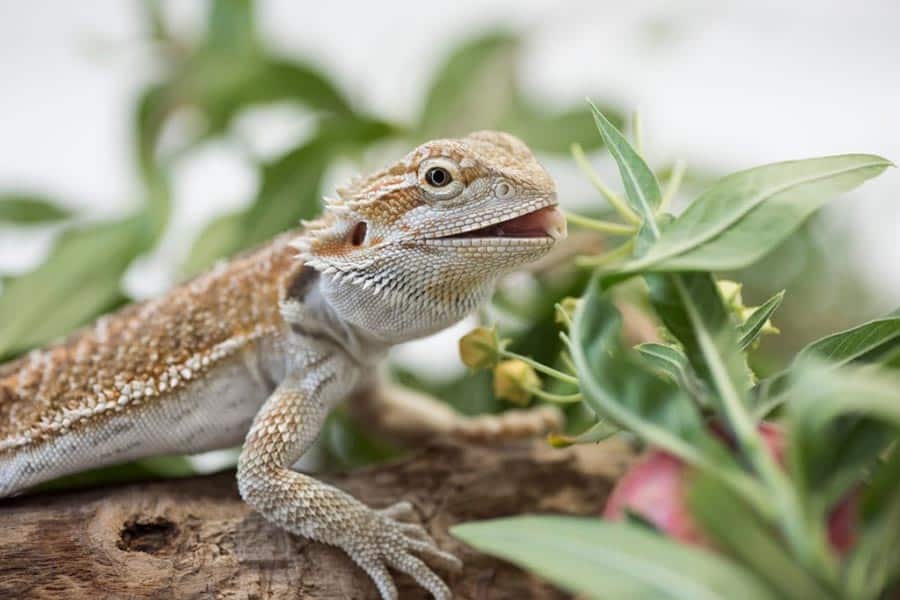As a new owner, you may be wondering: What do bearded dragons eat? Well, bearded dragons are omnivores, which means they need both animal protein (usually in the form of various insects) as well as plant matter in their diet.
Bearded dragons need a wide variety of different foods to grow and maintain healthy organs, bones, and muscles. Each food group provides your beardie with different vitamins and nutrients that they need to survive and remain healthy.
This article will take you through each food group that bearded dragons should have access to. We will also give you a list of foods to avoid feeding your beardie that are either not nutritionally beneficial, toxic, or even fatal.
The Protein Portion of a Beardie’s Diet
Bearded dragons need a varying amount of animal-based protein in their diet depending on their age.
As a general rule of thumb, for a baby bearded dragon, around 80% of their diet should consist of insect protein, while the other 20% should be made up of plant matter. Adult dragons will need this ratio flipped, so their diets will require 80% plant matter and 20% insect protein. You will need to gradually adjust this ratio accordingly as your beardie ages.
Ideally, animal protein should come from insects and not from mammals or birds, as meat from birds and mammals (such as pinkie mice, chicks, and eggs) is usually too large and not easily digestible for a bearded dragon. Foods that are too large can cause stomach problems and even impaction because a bearded dragon’s digestive tract is not designed to process it.
Not to worry, though, because there are many nutritious and delicious (to your beardie, anyway) insect options out there for you to choose from.
Staple Insects
Staple insects will make up the majority of your bearded dragon’s insect consumption. There are many great and fairly inexpensive staple insects to choose from, such as mealworms, Dubia roaches, and crickets.
The most popular insect protein for bearded dragons (especially babies) comes in the form of crickets. Crickets are easy to keep and breed yourself. They provide a healthy source of protein to your beardie and are relatively cheap and easy to find at most pet shops and online retailers.
Remember, your baby beardie can eat dozens of small crickets a day! Adults, on the other hand, will typically only eat about 10 to 20 or so every few days, as their diets are primarily made up of plant material.
If you struggle to get your hands on live crickets from your local distributors or you want to avoid feeding live insects completely, then you can feed your beardie freeze-dried crickets. The great thing about these freeze-dried crickets is they are gut loaded with
There are two main drawbacks of freeze-dried insects, though. The first problem is that some beardies will outright refuse them. There is nothing you can do about this, as some dragons will simply prefer live insects. The second drawback is freeze-dried bugs lack hydration, and bearded dragons get most of their water content from their food.
You can fix the second issue by spraying the crickets with a little water right before you feed your beardie, misting your beardie’s skin with cool water every day, or ensuring that they eat plenty of veggies and fruits with high moisture content. Even though they are desert dwellers, not enough moisture in their diet can lead to constipation and impaction.
Other insects that can form part of their regular, everyday diet include silkworms, hornworms, Dubia roaches, superworms, and mealworms. Most pet shops have a variety of different feeder insects perfect for your beardie’s diet.
Treat Insects
Everyone gets bored of their standard diets and likes to change things up with a treat now and then. The same goes for your beardie! However, too much of a good thing can become unhealthy. Too many fatty treat insects will lead to dental issues and obesity, which can be fatal to bearded dragons.
Juicy, squishy waxworms, butterworms, and phoenix worms are excellent treat items, though they aren’t particularly nutritious. If you can find them live from your local distributor or online retailer, they make great sensory stimulants. If you cannot find them live, do not worry there are canned options available.
Canned items like these waxworms are soft, delicious, and juicy and provide your bearded dragon with a bit of tasty variation in its diet.
However, as previously mentioned, treat items should be strictly controlled to avoid obesity. Only feed these insects to your beardie once or twice a week at most in small portions.
The Veggie Portion
As bearded dragons get older, the majority of their diet becomes plant-based. Plant matter provides your dragon with good nutrients and the roughage or fiber necessary to keep their digestive systems clear and working properly.
Although you should ideally provide your beardie with a dish of fresh, clean water at all times, much of your beardie’s water intake will come from the vegetable portion of their diet, so keep that in mind when you are buying produce.
Two main categories of vegetables should make up this portion of your dragon’s diet: dark, leafy greens and other safe staple vegetables like squashes and bell peppers.
Dark Greens
Dark, leafy greens should make up the majority of your dragon’s plant intake. These greens are highly nutritious and perfect for making up the base of any salads you feed to your beardie. Avoid light lettuces like iceberg and romaine, as they are primarily made up of water and lack other important nutrients.
Some great choices of greens for your beardie’s diet include the following:
- Dandelion greens
- Mustard greens
- Turnip greens and parsnip tops
- Collard greens
- Escarole
- Watercress
- Arugula or rocket
Other Safe Staple Veggies
There’s a wide range of great-tasting and nutritious vegetables you have to choose from when it comes to the rest of the staple vegetables you’ll be feeding to your dragon.
Some great choices include:
- Zucchini
- Parsnips
- Sweet potatoes
- Yellow squash
- Peas
- Bell peppers
- Carrots
- Butternut squash
These vegetables provide many of the vitamins your beardie needs to maintain healthy organs and bodily functions.
Providing your beardie with a colorful plate of food is not only stimulating for them but also provides them with a maximum amount of nutritional variation.
Fruit
Fruit is yummy to bearded dragons for the same reason it is to humans…it’s full of natural sugar! However, just like with fatty insects, too much sugar will cause health problems such as gum disease, tooth decay, and obesity, which will lead to death.
Fruit should only make up around 10% of your bearded dragon’s diet regardless of their age or size, so only offer it sparingly either as a treat or a salad topper.
Safe fruit options include:
- Watermelon
- Apples
- Blueberries
- Blackberries
- Raspberries
- Bananas
- Strawberries
- Plums
- Mangoes
Always remove all skins, seeds, pips, and stones from fruit before feeding them to your bearded dragon! If your dragon ingests these, they can cause choking, intestinal blockages, and death.
The Vitamin Supplement Portion
Bearded dragons must have ample
Calcium supplements such as this one from Fluker’s are widely available from both pet shops and online retailers. Food items should be dusted in
If your bearded dragon is getting adequate UVB for around 10 to 12 hours per day, they will not require any additional supplements. However, if you’re worried your beardie isn’t getting enough UVB for whatever reason, you can opt for a
Foods to Avoid Feeding a Bearded Dragon
While bearded dragons are hardy animals that can eat a wide range of insects, fruits, and vegetables, there are some foods you should avoid either because they lack nutritional value, interfere with
Bearded dragons should never eat the following foods:
Toxic Foods
- Avocado
- Insects that glow
- Rhubarb
- Eggplant
- Dairy products
- Onion
- Citrus fruits
- Chives
- Red meat
Foods That Interrupt Calcium Absorption
- Spinach
- Beet tops
- Kale
- Tomatoes
- Other plant matter high in phosphates and oxalates (Note: most fruits are somewhat high in oxalates, also known as oxalic acid, so only feed them sparingly!)
Foods That Lack Nutrients
Light-colored, watery lettuces like romaine and iceberg lettuce are not of nutritional value to your bearded dragon. Therefore, they should not be featured in your beardie’s diet. Instead, go for darker, leafy greens such as collard greens or turnip tops.
However, if you are worried your bearded dragon is not getting enough water, then give them a couple of pieces of light lettuce to boost their hydration.
FAQs on Beardie Food
How big should food items be?
All food items, whether they are insects or veggies, should not be larger than the space between your bearded dragon’s eyes. Be sure to cut any fruits or veggies into small pieces before feeding and opt for small insects for baby and juvenile dragons.
Consuming large food items can lead to choking or impaction.
What is impaction?
Impaction is a blockage of the digestive tract, usually the intestine. This happens when food is not small enough to pass through the system or there is a severe lack of hydration and the food gets stuck.
Another common cause of impaction is consuming small amounts of loose substrate.
Impaction is dangerous. If left untreated, the blockage will prevent your beardie from absorbing nutrients from its food, prevent them from having regular bowel movements, and cause infections and even death. Severe cases usually need surgery to fix. The surgery itself is often risky, stressful, and dangerous to the reptile, too.
Can I feed my baby bearded dragon mealworms?
It’s best to avoid them for baby and juvenile dragons. Mealworms have hard exoskeletons made of chitin. Baby bearded dragons often cannot process the exoskeleton and can become impacted. Stick to small soft insects like pinhead crickets for baby and juvenile bearded dragons.
Subadult and adult bearded dragons can be fed mealworms. However, they are not particularly nutritionally rich and are very dry. This means your beardie does not gain much from eating mealworms. For staple insects, it’s best to opt for Dubia roaches and crickets.
Should I cook my beardie’s veggies?
You should not cook your bearded dragon’s vegetables. The cooking process breaks down important fiber and nutrients in the plant matter. Instead, serve your beardie raw veggies. If you are worried they are too hard or too large, then make sure you cut them up into small pieces before feeding.
If you struggle to get fresh veggies for your beardie, you can use frozen vegetables, too! Just be sure to thaw them out beforehand.
Are live crickets better than freeze-dried ones?
Live crickets are better for your beardie than freeze-dried ones for two reasons.
- Live crickets contain much more moisture than dried ones which will keep your beardie properly hydrated.
- Live crickets allow your dragon to hunt, which mentally stimulates them and keeps them physically active. This stimulation is important to your bearded dragon’s health and happiness.
Can I catch insects in the garden for my beardie?
You should never catch insects from your garden for your bearded dragon! Insects from your garden could be incorrectly identified and be very toxic to your beardie. These insects can also carry internal parasites or be coated in harmful pesticides and insecticides which will negatively affect your bearded dragon’s health.
At the Tail End of Things
Now that you know what bearded dragons eat, you are better able to give your beardie a healthy and interesting diet, and you will be rewarded with a bearded dragon who eagerly awaits feeding time and lives a long and healthy life. Variety is key!







